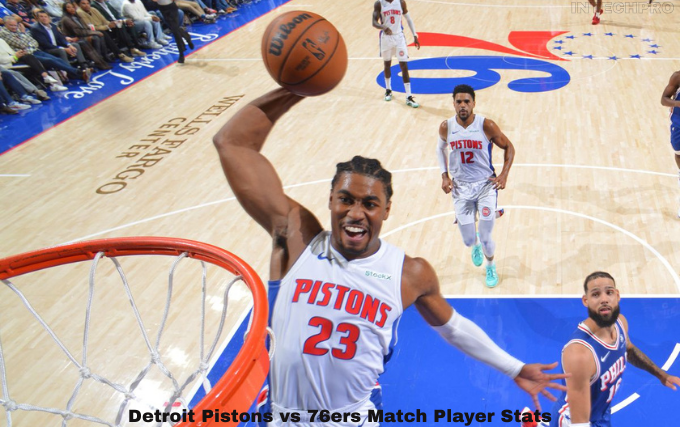Two legendary NBA teams with a long history of competitive play are the Detroit Pistons and the Philadelphia 76ers. Basketball fans can expect a battle of skill, strategy, and athleticism when these two teams play.
Overview of the Matchup
The Detroit Pistons and Philadelphia 76ers’ game featured opposing playing philosophies. The Pistons, who are renowned for their young energy and developing lineup, accelerated the game. The 76ers, on the other side, displayed their well-established cohesiveness and defensive prowess despite having a team full of All-Star players and seasoned players.
This game gave rising talents a chance to show off their skills and stars a platform to shine. The data illustrates how important players affected the result of the game.
Key Performers from the Detroit Pistons
Cade Cunningham
A key player in the game was Cade Cunningham, the Pistons’ rising star and former first overall draft selection. With 28 points, Cunningham, who is well-known for his flexibility, led the Pistons in scoring. In addition, he produced five assists and seven rebounds, showcasing his versatility in the game.
One of Cunningham’s best performances was his efficiency from the field, when he shot 45%. His ability to remain composed under duress and generate scoring opportunities for both himself and his teammates demonstrated his developing leadership maturity.
Jaden Ivey
The Pistons’ backcourt was electrified by Jaden Ivey’s presence. Ivey demonstrated his speed and court awareness while dishing out six assists and scoring eighteen points. Additionally, his defensive perseverance led to two thefts, which provided much-needed energy to both ends of the court.
Ivey’s performance highlighted his vital contribution to Detroit’s reconstruction, forming a strong alliance with Cunningham.
Isaiah Stewart
Isaiah Stewart dominated the boards for Detroit, securing 12 rebounds, including 5 offensive rebounds that gave the Pistons additional scoring opportunities. Stewart also added 10 points, achieving a double-double. His physical presence in the paint was a key factor in the Pistons’ ability to compete with Philadelphia’s formidable frontcourt.
Key Performers from the Philadelphia 76ers
Joel Embiid
Joel Embiid gave the 76ers a dominant performance, as was to be anticipated. With 33 points and 14 rebounds for a double-double, the reigning MVP demonstrated his attacking prowess. Embiid shot 12-of-14 from the free-throw line, demonstrating his ability to draw fouls.
Embiid successfully anchored Philadelphia’s inside defense with three blocks on defense. His performance confirmed that he is one of the best big men in the league.
Tyrese Maxey
Tyrese Maxey continued to impress as the 76ers’ primary backcourt scorer, contributing 25 points on an efficient 50% shooting. Maxey also collected 8 assists, guiding the offense effectively in transition and half-court circumstances. His pace and ball-handling created mismatches that Detroit struggled to contain.
Tobias Harris
Tobias Harris contributed 19 points and grabbed 9 rebounds, demonstrating his steady scoring presence. Harris was able to score from the outside as well as in the paint because of his versatility as a forward. His two-way skills were demonstrated by his defensive effort, which included two steals.
Comparative Team Statistics
Scoring Efficiency
Philadelphia displayed superior shooting efficiency, hitting 51% from the field compared to Detroit’s 44%. The 76ers’ ability to capitalize on high-percentage looks was a key differentiator. From beyond the arc, Philadelphia shot 38%, while Detroit struggled at 31%, indicating the Pistons’ need to improve their perimeter shooting.
Rebounding Battle
In a fiercely contested rebounding contest, Philadelphia defeated Detroit 45–42. On the glass, both sides showed determination, but the 76ers had the advantage because they were able to restrict Detroit’s second-chance opportunities.
Turnovers and Transition
The momentum of the game was greatly influenced by turnovers. Philadelphia scored 18 points as a result of Detroit’s 15 turnovers. The 76ers, on the other hand, had superior ball control and only committed 10 turnovers. With 20 fast-break points to Detroit’s 12, the 76ers were able to dominate transition play thanks to this advantage.
Free-Throw Shooting
Philadelphia had a significant advantage in free-throw efficiency, converting 88% of their attempts (22 out of 25). Conversely, Detroit struggled at the line, shooting 16 of 22 for 73%. The discrepancy in the Pistons’ accuracy of free throws highlighted their need for development in this area.
Defensive Matchups and Adjustments
The defensive strategies employed by both teams were pivotal. Philadelphia’s defense was anchored by Joel Embiid, whose rim protection limited Detroit’s inside scoring. The 76ers effectively double-teamed Cade Cunningham at times, forcing the Pistons to rely on secondary scorers.
Detroit, in turn, looked to disrupt Philadelphia’s rhythm by bringing full-court pressure and double Embiid in the post. While this technique yielded some turnovers, it often left shooters like Maxey and Harris exposed, which proved costly.
Bench Contributions
Philadelphia’s depth, shown by De’Anthony Melton’s 10 points and 3 assists, gave crucial support throughout crucial portions of the game, while the 76ers’ bench outperformed Detroit’s, scoring 32 points to the Pistons’ 24.
Marvin Bagley III was the most notable contribution with 12 points, but Detroit’s bench found it difficult to sustain offensive momentum. A hole in the Pistons’ rotation was brought to light by the inconsistent output from other reserves.
Impact of Coaching Strategies
The game was significantly shaped by coaching. While Detroit’s coach prioritized aggressive defensive tactics to offset the 76ers’ scoring power, Philadelphia’s head coach purposefully spaced out Embiid and Maxey’s minutes to maintain offensive flow.
The adjustments made by Philadelphia, particularly in the second half, allowed them to exploit mismatches and control the pace. Detroit’s inability to counter these adjustments contributed to their eventual defeat.
Conclusion
The game between the Detroit Pistons and the Philadelphia 76ers highlighted the stark contrast in experience and roster depth between the two teams. While Detroit showed flashes of brilliance through the performances of Cade Cunningham and Jaden Ivey, Philadelphia’s cohesive play and standout contributions from Joel Embiid and Tyrese Maxey ultimately secured their victory.
This meeting provided as a learning lesson for the young Pistons, while the 76ers continued to push themselves as a strong competitor in the Eastern Conference. As the season unfolds, both sides will attempt to build on the lessons from this game, with an eye on future confrontations that promise even more excitement.


